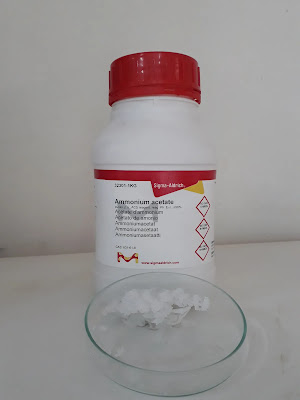Product Identification
- A Perfect Solution for Your Needs – Ammonium Acetate SDS!
- Product Name: Ammonium Acetate C₂H₇NO₂.
- CAS Number: 631-61-8.
Hazards Identification
A substance called ammonium acetate is moderately hazardous. It irritates the skin, eyes, & respiratory system. Dust or mist inhalation might irritate the respiratory system & make you cough. Skin contact that is prolonged or repetitive may result in dermatitis.
Handling & Storage
- Keep away from heat, sparks, & open flame.
- Store in a cool, dry, well-ventilated area.
- Keep the container tightly closed.
- Use appropriate personal protective equipment (PPE) when handling or working with ammonium acetate.
- Avoid breathing dust or mist.
- Avoid contact with skin and eyes.
- Wash hands thoroughly after handling.
Fire-Fighting Measures
- Ammonium acetate is not flammable.
- Use water spray, alcohol-resistant foam, dry chemical or carbon dioxide to extinguish.
Accidental Release Measures
- Wear appropriate personal protective equipment.
- Ventilate the area.
- Sweep up or absorb the material and place it in a suitable container for disposal.
- Avoid breathing dust or mist.
Toxicity Information
- Acute oral toxicity (LD50): 3,500 mg/kg (rat)
- Acute dermal toxicity (LD50): 2,000 mg/kg (rabbit)
- Irritation: Moderate eye and skin irritant.
Physical & Chemical Properties
- Appearance: White crystalline powder.
- Odor: None.
- pH: 7.5 (0.1 M solution).
- Melting point: 114 °C.
- Boiling point: 117.1 °C.
- Vapor pressure: Not available.
- Density: 1.17 g/cm3.
- Molar Mass: 77.0825 g/mol.
- Formula: NH₄CH₃CO₂.
- Solubility: Soluble in water & Methanol.
Stability & Reactivity
- Stable under normal conditions.
- Incompatible with strong acids and oxidizing agents.
- Decomposes at high temperatures.
Disposal Considerations
- Dispose of in accordance with all local, state, and federal regulations.

Conclusion
Read Ammonium Acetate SDS before handling this product. Ammonium acetate is a chemical that can irritate the eyes, skin, & respiratory system. It is mildly hazardous. Ammonium acetate must be handled, stored, & used with the correct personal protection equipment at all times. In the event of an accident, it’s crucial to ventilate the area to prevent dust or mist inhalation. Ammonium acetate should be disposed of in compliance with all applicable national, state, & municipal laws.
